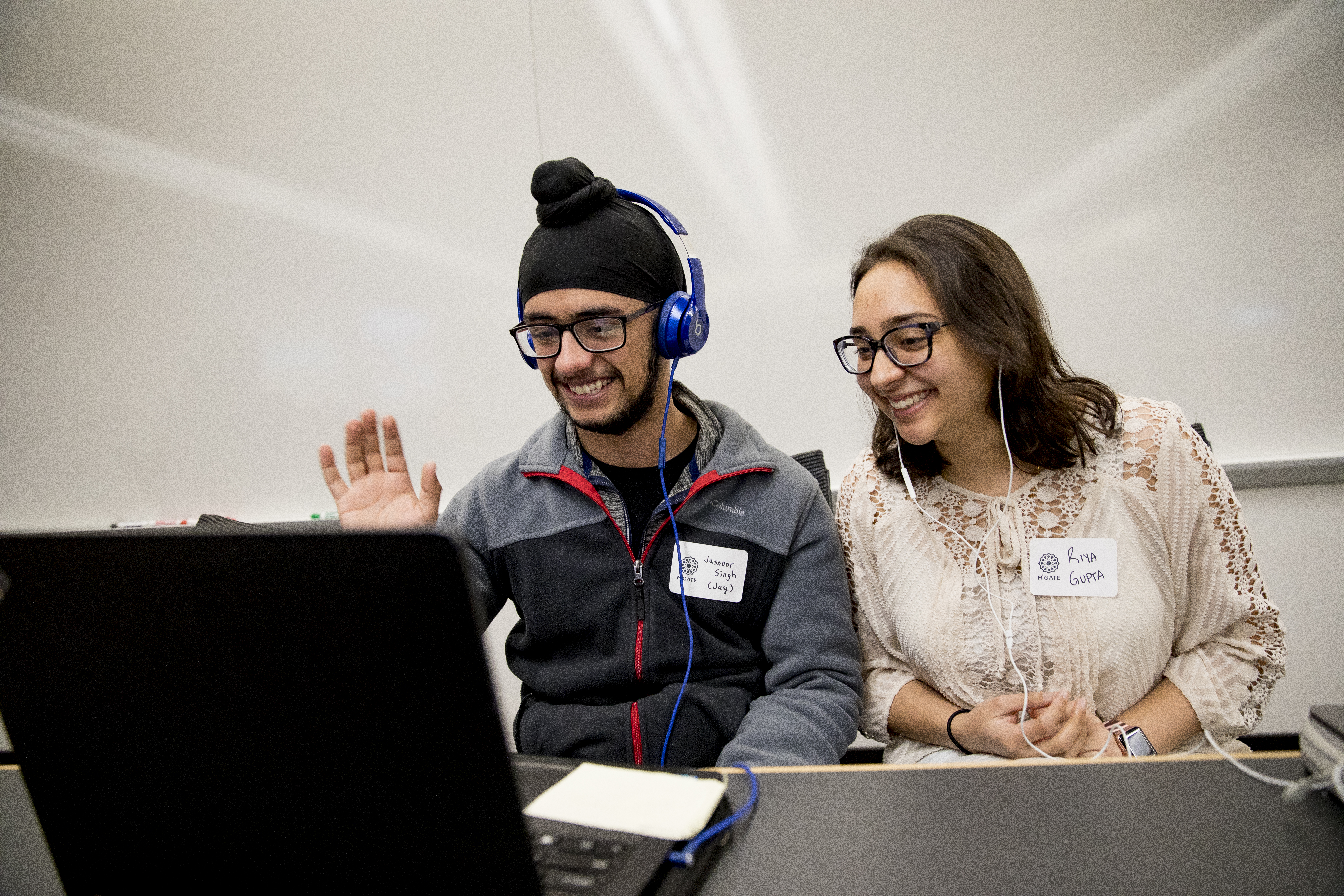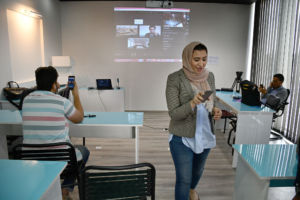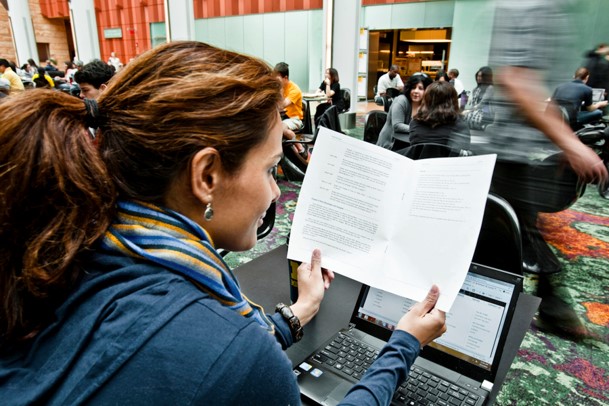
Cross-cultural relationships in business can be challenging, but students adept at navigating them are far more likely to excel in business— not to mention a host of other global professions and fields.
A unique course, offered at the Ross School of Business and facilitated by WDI, will equip students with the skills they need to work on cross-cultural, geographically dispersed teams so common in today’s business world. Open to all majors, the course uses technology to connect U-M students with their peers in Egypt, Lebanon and Libya.
Business & Culture: A Virtual Practicum (BA310), a new 14-week, three-credit course, will serve up a mix of traditional classroom sessions and hands-on, experiential activities. The innovative course will be offered in the winter 2020 semester and most students may register through Wolverine Access now.
The course will increase students’ awareness of the scope and nature of cross-cultural business and allow them to apply their new knowledge through work in international teams. It will be led by Ross Clinical Assistant Professor and WDI Faculty Affiliate John Branch, along with professors from American University in Cairo and American University in Beirut and the founder of the Benghazi Youth for Technology and Entrepreneurship in Libya.
“Success in business, and increasingly also in life in general, requires cultural competence—the ability to navigate culturally awkward situations, respect for alternative worldviews and the skills to lead people who are different,” Branch said. “Arguably, when it comes to developing cultural competence, nothing can replace a cross-cultural experience living, studying, or working abroad.”
But Branch said today’s interconnected world allows a simulation of a cross-cultural experience.
“Using the internet and other technologies, it enables students from four countries to work and study together,” he said. “They will ‘attend’ course sessions together, studying cases which reveal unique cultural approaches to business.”
Students will maintain a journal filled with their cultural reflections and also participate in an online discussion forum with their international peers where ideas, opinions and questions are shared. For the final project, students will form international teams and research and plan the internationalization of a fictitious company.

The course is expected to run four times beginning winter 2020. It builds off WDI’s successful project from 2017 and 2018, the MENA-Michigan Initiative for Global Action Through Entrepreneurship (M²GATE) program. That project brought together more than 400 students from five Michigan university campuses, including U-M, and their peers in Egypt, Libya, Morocco and Tunisia. M²GATE and the Business & Culture course were both supported by the Stevens Initiative, which is sponsored by the U.S. Department of State, with funding provided by the U.S. Government, and is administered by the Aspen Institute. The Stevens Initiative is also supported by the Bezos Family Foundation and the governments of Morocco and the United Arab Emirates.
In addition, WDI’s Performance Measurement and Improvement (PMI) will evaluate the impact the program has on students in the U.S., Libya, Lebanon and Egypt in areas such as empathy and cross-cultural skills, and use the findings to look for ways to improve subsequent BA310 classes. The data from the PMI team’s work also will be used to optimize future virtual exchange courses.
“Virtual exchange is an ideal way to prepare students for the global workforce they’ll soon be part of,” said Amy Gillett, academic advisor of the new program and vice president of WDI’s Education sector. “It’s also a fun and exciting way to learn and a great way to build an international network.”

WDI Publishing is organizing a new competition for case studies focusing on the unique advantages and challenges of doing business in the Middle East and North Africa (MENA) region.
Submissions for the competition, “Doing Business in the Middle East, North Africa Region,” should focus on a business dilemma of an organization or company located or doing business in the MENA region. The cases may feature a small or large organization, private sector multinational, non-governmental organization (NGO) or nonprofit.
The global competition is open to individual students or student teams, as long as they enter in collaboration with a faculty member from a degree-granting university or college. Faculty or faculty teams may also enter as long as they are currently teaching at a degree-granting university or college. Other individuals may also enter, provided they do so in collaboration with a faculty member from a degree-granting university or college.
The winning entry will be awarded $5,000. Second place will earn $3,500 and third place $1,500. Additionally, all three winning cases will be published by WDI Publishing and added to its case catalogue. Entry forms are due Dec. 12, 2019, and the final case and teaching note must be turned in by Feb. 9, 2020. Winners will be announced on March 20, 2020.

To learn more about key deadlines, entry requirements, judging criteria and to access entry forms and submission documents, click here. For resources on how to write a case study and a teaching note, along with other helpful information, click here.
WDI Publishing has assembled an impressive panel of judges for the competition. They are:
Kim Bettcher – Center for International Private Enterprise (CIPE)
Andrew J. Hoffman – University of Michigan Ross School of Business
Manel Khadraoui – University of Tunis/Tunis Business School
Hagop Panossian – American University of Beirut Olayan School of Business
WDI Publishing Manager Sandy Draheim said she hopes the competition will encourage the development of new, academic case studies about the MENA region, increase the understanding of doing business there and grow the critical thinking skills of university students in these countries through the use of these new MENA-focused cases.
“There are many regions of the world that could use more ‘localized’ business case studies for higher education,” Draheim said. “But, partly based on the incredible response, interest and results of WDI’s M²GATE program, we thought it would be interesting to target our first geographically-themed case competition around MENA issues. We want to elevate the quality and quantity of teaching materials that provide students – both in the MENA region and around the world – with opportunities to take on the roles and responsibilities of managers in organizations located or doing business in this region.”
WDI is a collaborative, multi-disciplinary organization. As a result, it often engages multiple sector and services teams in our work. The following project undertaken by both our Education sector and Performance Measurement and Improvement service demonstrates our holistic approach. The Education sector implemented Business & Culture: A Virtual Practicum — a classroom-to-classroom, action-learning course on international business cultures that brings together undergraduate students from Egypt, Libya and the U.S., supported by the Stevens Initiative. The course ran five times at the Ross School of Business, starting in Winter 2020. Participants attended lectures by international faculty, worked on interregional teams through synchronous and asynchronous exchange, employed field research methods to learn about one another’s business cultures and created a final project that captured their cross-cultural learnings. The program equipped young people in the U.S. and MENA region with the necessary competencies to communicate, problem-solve and collaborate in a global team environment—all essential 21st century skills in an interconnected world. The Education sector collaborated with the Performance Measurement and Improvement service, which led the design and implementation of an impact evaluation of the program on students in the U.S., Libya, Lebanon and Egypt. In addition to assessing the impact of the program on student outcomes (e.g. empathy, cross-cultural communication skills, business skills and knowledge), the data was used to improve the course and develop generalizable knowledge on how to increase the impact of virtual exchange courses.